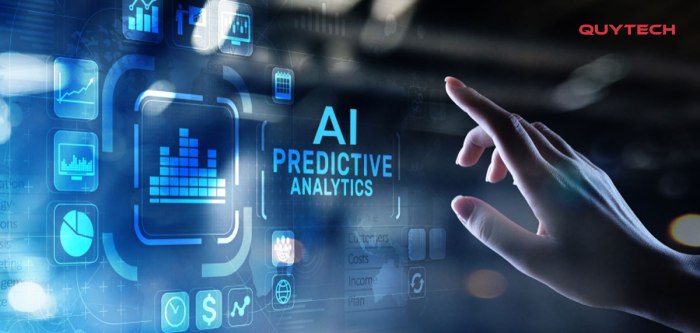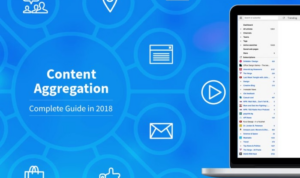With AI in predictive analytics for business at the forefront, get ready to dive into a world where data-driven insights pave the way for smarter choices and strategic moves in the corporate landscape. From predicting customer behavior to optimizing inventory management, the power of AI is reshaping how businesses operate in the digital age.
Introduction to AI in Predictive Analytics for Business
Predictive analytics in the business context involves using historical data, statistical algorithms, and machine learning techniques to identify the likelihood of future outcomes based on historical data. It helps businesses make informed decisions, anticipate trends, and optimize processes.
Role of AI in Enhancing Predictive Analytics for Businesses
Artificial Intelligence (AI) plays a crucial role in enhancing predictive analytics for businesses by enabling more accurate predictions and insights. AI algorithms can process vast amounts of data at high speeds, identify complex patterns, and continuously learn and improve predictions over time.
Benefits of Incorporating AI into Predictive Analytics for Business Decision-Making
- Improved Accuracy: AI algorithms can analyze data more efficiently and accurately than traditional methods, leading to more reliable predictions.
- Real-time Insights: AI can provide businesses with real-time insights and recommendations, allowing for quicker decision-making.
- Cost Efficiency: By automating data analysis and prediction processes, AI can help businesses save time and resources.
- Enhanced Customer Experience: AI-powered predictive analytics can help businesses personalize customer experiences and tailor products and services to individual needs.
Applications of AI in Predictive Analytics for Business
Artificial Intelligence (AI) plays a crucial role in predictive analytics for businesses, offering a wide range of applications to optimize operations and enhance decision-making processes.
Predicting Customer Behavior for Marketing Purposes
AI is utilized in analyzing vast amounts of data to predict customer behavior, enabling businesses to tailor marketing strategies and campaigns effectively. By understanding customer preferences and tendencies, companies can target specific demographics with personalized offers, resulting in higher conversion rates and customer satisfaction.
Forecasting Sales Trends and Optimizing Inventory Management
Through AI algorithms, businesses can forecast sales trends based on historical data, market conditions, and other relevant factors. This enables companies to optimize inventory management by adjusting stock levels, pricing strategies, and promotional activities to meet demand fluctuations effectively. By leveraging predictive analytics, businesses can reduce costs, minimize stockouts, and enhance overall profitability.
Predicting Equipment Failures and Enabling Predictive Maintenance
AI algorithms can analyze equipment performance data in real-time to predict potential failures before they occur. By implementing predictive maintenance strategies, businesses can schedule maintenance tasks proactively, minimize downtime, and extend the lifespan of machinery and equipment. This predictive approach helps businesses save costs on repairs and replacements while ensuring operational continuity.
Tools and Technologies for AI in Predictive Analytics: AI In Predictive Analytics For Business

Artificial Intelligence (AI) has revolutionized the field of predictive analytics for businesses, offering a wide range of tools and technologies to analyze data and make accurate predictions.
Popular AI Tools and Technologies, AI in predictive analytics for business
- Python: A versatile programming language with libraries like TensorFlow and Scikit-Learn for implementing machine learning algorithms.
- R: Statistical software used for data analysis and visualization, with packages like Caret for predictive modeling.
- IBM Watson: AI platform that provides tools for data analysis, machine learning, and natural language processing.
- H2O.ai: Open-source AI platform that offers automated machine learning and predictive analytics capabilities.
Machine Learning Algorithms in Predictive Analytics
Machine learning algorithms are essential in predictive analytics as they enable systems to learn from data, identify patterns, and make predictions without being explicitly programmed. These algorithms analyze historical data to make accurate predictions about future outcomes, helping businesses make informed decisions.
Importance of Big Data Processing Platforms
Big data processing platforms play a crucial role in predictive analytics by handling large datasets efficiently. Platforms like Apache Hadoop and Spark are used to process vast amounts of data quickly, enabling businesses to extract valuable insights and patterns for predictive modeling. These platforms provide scalability and performance to analyze massive datasets, making them essential in the field of AI-driven predictive analytics.
Challenges and Limitations of AI in Predictive Analytics
When it comes to implementing AI in predictive analytics for businesses, several challenges and limitations need to be considered to ensure effective use of these technologies.
Common Challenges Faced
- Quality of Data: AI models heavily rely on the quality of data they are trained on. Inaccurate or incomplete data can lead to flawed predictions and unreliable insights.
- Interpretability: AI algorithms often operate as “black boxes,” making it difficult for users to understand how decisions are made. This lack of transparency can be a significant challenge in gaining trust and acceptance.
- Integration with Existing Systems: Integrating AI solutions with existing business systems and processes can be complex and time-consuming, requiring significant resources and expertise.
Potential Limitations in Accuracy
- Overfitting: AI models can sometimes become too complex and overfit the training data, leading to poor generalization and inaccurate predictions on new data.
- Data Bias: Biases present in the training data can be perpetuated by AI models, resulting in unfair predictions and reinforcing existing inequalities.
- Lack of Contextual Understanding: AI systems may struggle to understand nuanced contexts or make accurate predictions in situations that deviate from the patterns seen in the training data.
Ethical Considerations and Biases
- Algorithmic Bias: AI algorithms can inadvertently perpetuate societal biases present in the data, leading to discriminatory outcomes that impact certain groups unfairly.
- Privacy Concerns: The use of AI in predictive analytics raises privacy concerns as sensitive data is often used to make predictions, requiring careful handling to ensure data protection and compliance with regulations.
- Transparency and Accountability: Ensuring transparency in how AI models make predictions and being accountable for the decisions they make is essential to maintain ethical standards in predictive analytics.






